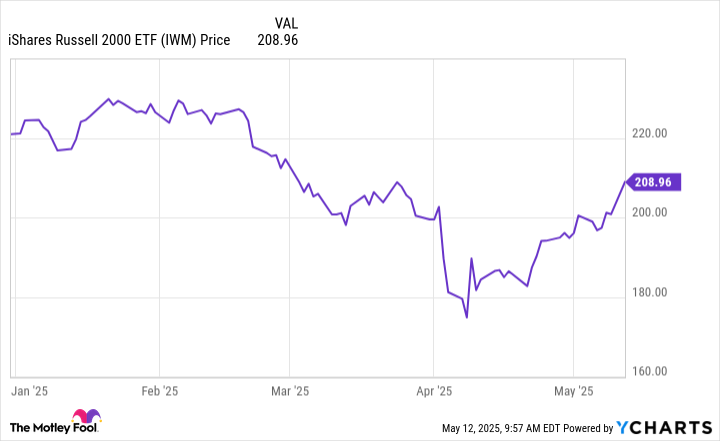When we think of investing, some of the world’s biggest names might pop into our minds — from Amazon, to Nvidia or Coca-Cola. You’ll find these large capitalization players in major indexes such as the S&P 500 (^GSPC 3.26%) or the Dow Jones Industrial Average (^DJI 2.81%). It’s a fantastic idea to hold a variety of these companies in your portfolio or invest in an exchange-traded fund (ETF) that can offer you exposure to them.
But along with this, it’s also a great idea to expand your holdings across some smaller companies that also have proven their strength over time. You may not be as familiar with their businesses, so it might be difficult to hand-pick them — and that’s why you should consider turning to an ETF that can offer you access to many with one simple purchase.
A fantastic one to try today is the iShares Russell 2000 ETF (IWM 3.43%), a low-cost fund that tracks the performance of this small-cap index. Let’s find out more about this ETF to buy with $500 right now.
Image source: Getty Images.
ETFs and stock picking
So, first, let’s talk a bit about ETFs and why they could complement your stock-picking strategy. You may know certain sectors or companies very well, and here, you’ve been able to carefully select stocks for your portfolio. But you might not be as comfortable with a particular sector, or as I mentioned, small-cap players. And here, ETFs offer you an easy, low-risk way to bet on these particular themes.
ETFs include many stocks according to industry, like biotech, for example; investment style such as growth investing; or in the case I’m talking about here, market value and index. An ETF tracks a benchmark that reflects the chosen theme. So by investing in the ETF, you don’t have to be an expert in the field to access the most promising players. A pretty good deal, right?
On top of that, these instruments generally don’t involve huge costs that will eat into long-term returns. It’s important, though, to only invest in ETFs with an expense ratio of less than 1%.
Now, let’s turn our attention to the iShares Russell 2000 ETF, a fund with an expense ratio of 0.1%, so it largely fits our low-cost criteria. This asset tracks the Russell 2000, an index that as you could probably guess by its name, tracks 2,000 U.S. small-cap stocks. You may recognize some of these players, such as top holding Sprouts Farmers Market or telehealth company Hims & Hers Health. These two are among the five biggest positions in the fund, according to weight. And, by investing in this ETF, you’ll gain access to 11 different industries, from financials — representing the biggest market value in the fund — to communication — the smallest market value in the fund.
Annual rebalancing of the Russell 2000
But this composition isn’t set in stone. Importantly, every year, the index reconsiders its members, adding or deleting as necessary to accurately reflect the market of the times. And ETFs tracking the index must follow. So, an investment in this ETF will offer you ongoing exposure to the small-cap companies driving the economy of the day.
This is a fantastic way to diversify across industries and individual stocks, considering the sheer number of companies in the index, and therefore in the ETF. Of course, these U.S. small caps could be more vulnerable to any potential economic downturn in the U.S., but on the positive side, the more domestically focused players could be less sensitive to import tariffs.
President Donald Trump set out a plan for tariffs last month and now is negotiating with various countries to determine levels. A Russell 2000 company such as Hims & Hers, offering telehealth to the U.S. market, isn’t likely to see much of an impact from eventual import tariffs.
The iShares Russell 2000 ETF has rebounded from lows reached last month, but it’s still down about 9% since the start of the year. This offers you, with $500 or even less, an opportunity to get in on a broad array of U.S. companies that are key to the current economic story — and today and over the long term, this purchase could add both safety and growth to your portfolio.
John Mackey, former CEO of Whole Foods Market, an Amazon subsidiary, is a member of The Motley Fool’s board of directors. Adria Cimino has positions in Amazon. The Motley Fool has positions in and recommends Amazon and Nvidia. The Motley Fool recommends Sprouts Farmers Market. The Motley Fool has a disclosure policy.






